Are you wondering when the perfect time is to start cooking with your kids? Cooking with children offers countless benefits, from fostering creativity and family bonding to teaching valuable life skills. Whether you’re looking for fun baking projects or safe kitchen activities, cooking with kids is a rewarding experience that can begin at almost any age. In this article, we’ll explore everything you need to know, including the ideal age to start, creative recipe ideas, and essential safety tips to ensure a enjoyable experience for everyone. From simple tasks for toddlers to more complex activities for older children, discover how cooking can become a cherished family tradition.
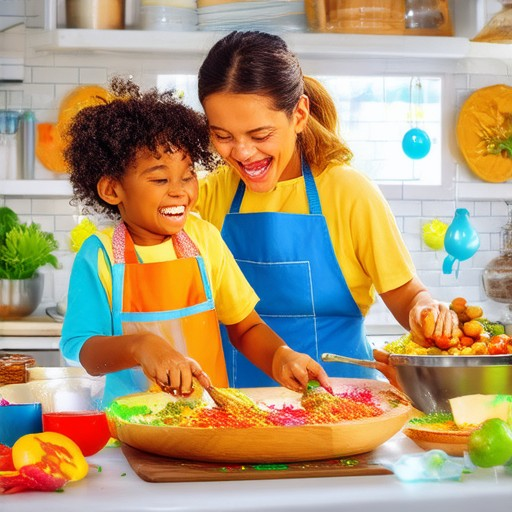
What is Fun to Cook with Kids?
Cooking with kids can be a delightful and engaging activity that sparks curiosity and creativity. Here are some fun ways to involve children in the kitchen:
- Baking Together: Start with simple recipes like muffins or cookies. Allow kids to mix ingredients and decorate with colorful toppings.
- Pizza Making: Let kids top individual pizzas with a variety of cheeses, meats, and vegetables. This encourages creativity and responsibility.
- Salad Creation: Provide a selection of fresh vegetables, fruits, and dressings. Kids can assemble their own unique salads.
- Culinary Exploration: Introduce kids to new textures and flavors by trying different foods from around the world.
- Kitchen Safety: Teach basic safety rules and involve kids in age-appropriate tasks like washing fruits or using kid-friendly tools.
- Meal Planning: Let kids choose recipes or menu items, giving them a sense of ownership and responsibility.
- Creative Decorations: Allow kids to decorate baked goods or meals with fun toppings, sparkles, or colorful arrangements.
- Teamwork: Encourage collaboration by having kids work together on a shared recipe, fostering teamwork and communication.
By involving kids in these activities, you create a fun and educational experience that strengthens family bonds and nurtures essential life skills.
What Age Can You Start Cooking with Kids?
The optimal age to begin teaching kids how to cook varies depending on their maturity, curiosity, and attention span. While there isn’t a universal “best” age, many experts suggest starting between 6 to 10 years old . Here’s why:
- Preschoolers (3–5 years):
- They may show initial interest in cooking due to their curiosity and love for exploration.
- Simple tasks like stirring or pouring can be introduced, requiring minimal supervision.
- However, their fine motor skills and understanding of safety may still be developing.
- Early Elementary (6–8 years):
- This age group typically has better attention spans and can understand basic cooking instructions.
- Tasks like following a recipe, using utensils safely, and assisting with meal preparation become feasible.
- Their growing sense of independence makes them excited to contribute to family meals.
- Later Elementary (9–12 years):
- Older kids often possess better fine motor skills and can handle more complex tasks.
- They may benefit from learning advanced techniques and taking on more kitchen responsibilities.
- This stage can also help build confidence and life skills beyond the classroom.
- Teens (13+ years):
- Teens can handle more advanced cooking methods and may develop a deeper appreciation for culinary arts.
- They often have more freedom to experiment and manage kitchen tasks independently.
Ultimately, the decision should align with the child’s readiness and your family’s lifestyle. Introducing cooking at an early age, with gradual increases in responsibility, can foster a lifelong skill and shared family memories.
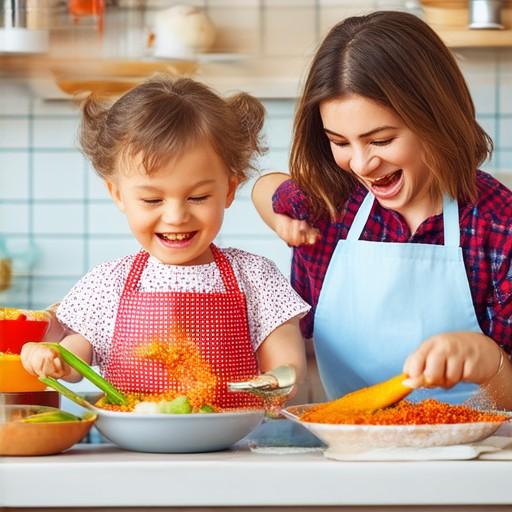
What is the quote about cooking with kids?
Guy Fieri once said, “Cooking with kids is not just about ingredients, recipes, and cooking. It’s about harnessing imagination, empowerment, and creativity.” This quote captures the essence of the joyful experience that comes with involving children in the kitchen.
At Memories Restaurant, we believe that cooking with kids is much more than just preparing meals. It’s about creating memories, teaching valuable life skills, and fostering a love for cooking that can last a lifetime. Here’s why cooking with kids is such a rewarding experience:
- Teaching Life Skills:** Cooking with kids allows them to learn essential life skills like measuring, following instructions, and working collaboratively. These skills are not only useful in the kitchen but also in everyday life.
- Fostering Creativity:** Cooking provides a great outlet for creativity. Kids can experiment with different flavors, textures, and presentation techniques, leading to unique and delicious dishes.
- Bonding Over Meals:** Sharing the experience of cooking together strengthens family bonds. It creates a shared memory that everyone can cherish.
- Exploring New Tastes:** Introducing kids to new foods and cuisines broadens their palates and opens their minds to diverse cultures and traditions.
Memories Restaurant offers a variety of resources and recipes tailored for families who want to cook together. From simple kid-friendly meals to more complex projects, our platform has something for everyone. Visit us today at Memories Restaurant to discover more about the joys of cooking with kids!

What Should a 5-Year-Old Be Able to Cook?
At five years old, a child can begin to explore the basics of cooking with appropriate guidance and tools. Here are some simple and safe cooking activities that a 5-year-old can handle:
- Simple Cooking Tasks:
- Measuring ingredients using plastic measuring cups.
- Mixing ingredients with a small whisk or spoon.
- Boiling water for pasta or vegetables.
- Making simple snacks like fruit slices or cheese sticks.
- Pouring cereal into a bowl.
- Baking Ideas:
- Microwaving simple cookies or muffins using pre-made dough.
- Helping bake simple bread or pizza using store-bought dough with adult supervision.
- Basic Cooking Skills:
- Learning to use basic kitchen tools like a small saucepan or pot.
- Stirring soups or sauces with a wooden spoon.
- Preparing simple meals like scrambled eggs or oatmeal.
- Snack Recipes:
- Making peanut butter and jelly sandwiches.
- Cutting fruits and vegetables into slices with a butter knife under adult supervision.
- Mixing a simple smoothie with fruits and yogurt.
- Kitchen Tools:
- A small saucepan or pot with handles.
- Plastic measuring cups and spoons.
- A sturdy cutting board and a butter knife for soft foods.
- Kid-friendly utensils like spatulas and mixing bowls.
Always ensure to supervise children in the kitchen and use non-stick pans to prevent accidents. Encourage exploration and creativity while teaching basic kitchen safety rules.
Is 5 Too Old for a Play Kitchen?
A play kitchen is a fantastic toy that encourages creativity and pretend play, regardless of your child’s age. While many children begin playing with a kitchen toy around 18 months to 3 years old, there’s no upper age limit. In fact, older children often enjoy the imaginative fun even more.
When to Start
- Play kitchens are suitable for toddlers (18 months+) and continue to be enjoyed by preschoolers, kindergarteners, and even school-age children.
Benefits Beyond Age 5
- Older children can explore more complex scenarios, such as cooking elaborate meals or running a restaurant.
- Play kitchens encourage problem-solving skills, social interaction, and storytelling, all of which are beneficial at any age.
Choosing the Right Size
- Look for a play kitchen that suits your child’s height and interests. Some models are designed for younger children, while others are more adult-oriented.
Developmental Insights
- Even at 5, your child can benefit from role-playing activities that strengthen fine motor skills, memory, and decision-making abilities.
Learn more about selecting the perfect play kitchen for your child.
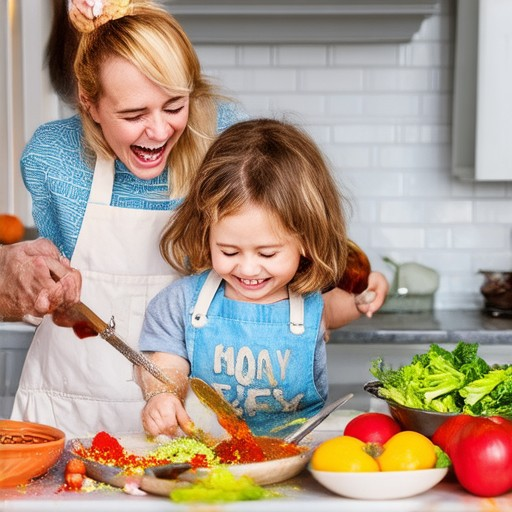
What Age Can a Child Use a Microwave?
Children under the age of 7 should not use a microwave without proper supervision. This is due to their smaller size, which may prevent them from reaching the controls safely, and the risk of burns from hot food. Microwaves can become extremely hot, and leaving a child alone could result in serious injury.
Supervision is crucial for children aged 8 and older. Parents or caregivers should demonstrate how to use the microwave correctly, emphasizing the importance of opening the door after heating and avoiding touching hot dishes. Always ensure the microwave is turned off and unplugged before allowing a child to use it unsupervised.
For added safety, consider microwaves with child-safe features, such as locking mechanisms designed to prevent accidental operation. Teach your child to pull the door open gently after heating food and to handle hot items with oven mitts.
If a child does misuse the microwave, turn off the power immediately and remove them from the area until an adult can assist. Store hot foods out of reach until they cool down completely.
Always keep microwaves accessible but secure, especially when young children are present. By teaching proper usage and enforcing safety rules, you can help ensure your child uses the microwave responsibly and safely.

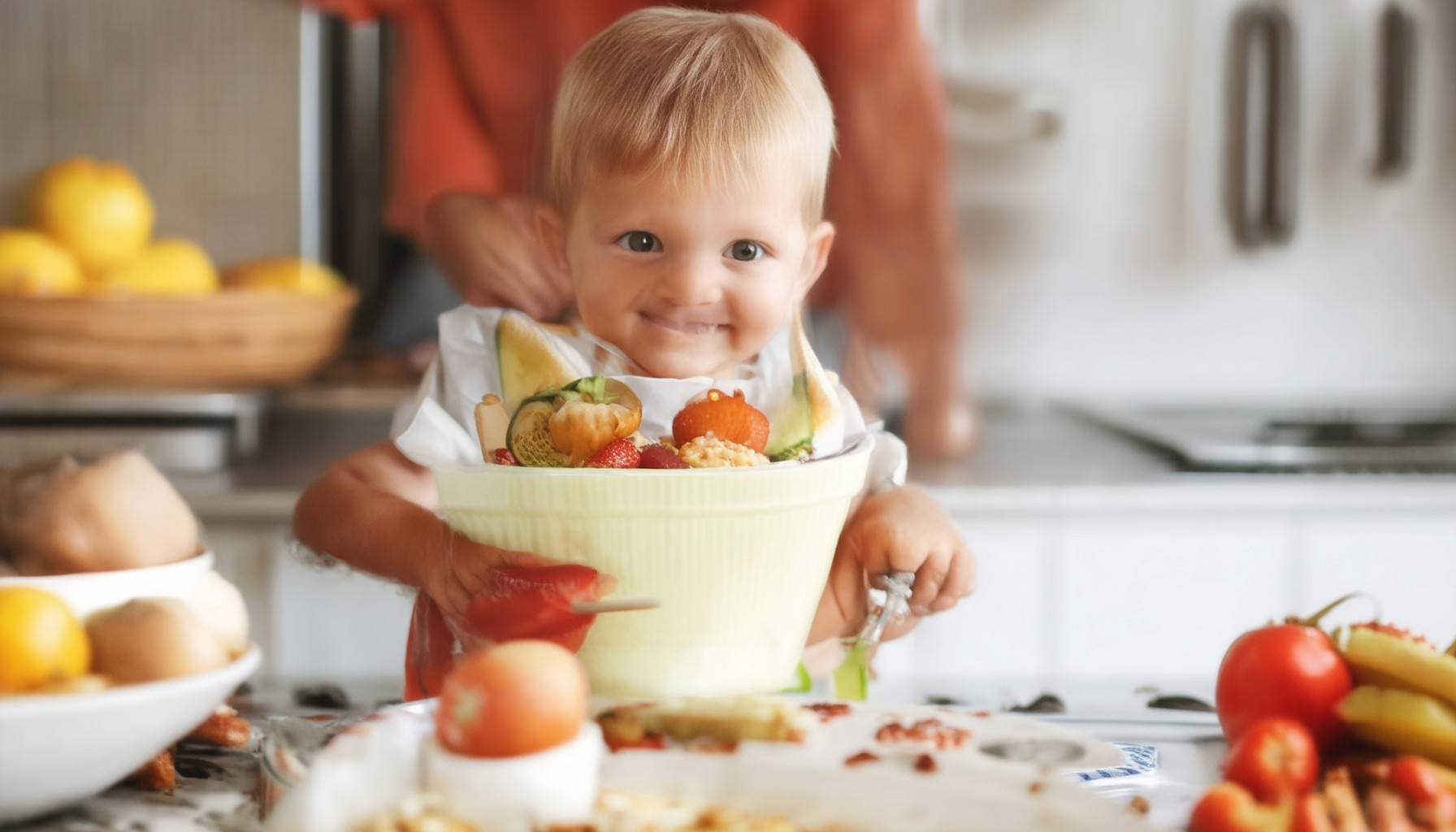

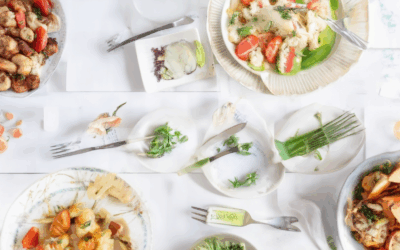

0 Comments